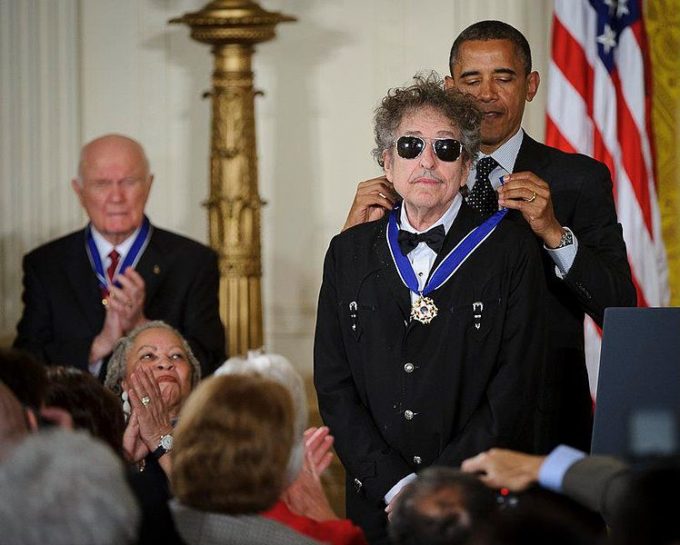Bob Dylan on Moby Dick

“Here’s a face. I’ll put it in front of you. Read it if you can.”
From the Nobel Prize lecture:
Moby Dick is a fascinating book, a book that’s filled with scenes of high drama and dramatic dialogue. The book makes demands on you. The plot is straightforward. The mysterious Captain Ahab — captain of a ship called the Pequod — an egomaniac with a peg leg pursuing his nemesis, the great white whale Moby Dick who took his leg. And he pursues him all the way from the Atlantic around the tip of Africa and into the Indian Ocean. He pursues the whale around both sides of the earth. It’s an abstract goal, nothing concrete or definite. He calls Moby the emperor, sees him as the embodiment of evil. Ahab’s got a wife and child back in Nantucket that he reminisces about now and again. You can anticipate what will happen.
The ship’s crew is made up of men of different races, and any one of them who sights the whale will be given the reward of a gold coin. A lot of Zodiac symbols, religious allegory, stereotypes. Ahab encounters other whaling vessels, presses the captains for details about Moby. Have they seen him? There’s a crazy prophet, Gabriel, on one of the vessels, and he predicts Ahab’s doom. Says Moby is the incarnate of a Shaker god, and that any dealings with him will lead to disaster. He says that to Captain Ahab. Another ship’s captain — Captain Boomer — he lost an arm to Moby. But he tolerates that, and he’s happy to have survived. He can’t accept Ahab’s lust for vengeance.
This book tells how different men react in different ways to the same experience. A lot of Old Testament, biblical allegory: Gabriel, Rachel, Jeroboam, Bildah, Elijah. Pagan names as well: Tashtego, Flask, Daggoo, Fleece, Starbuck, Stubb, Martha’s Vineyard. The Pagans are idol worshippers. Some worship little wax figures, some wooden figures. Some worship fire. The Pequod is the name of an Indian tribe.
Moby Dick is a seafaring tale. One of the men, the narrator, says, “Call me Ishmael.” Somebody asks him where he’s from, and he says, “It’s not down on any map. True places never are.” Stubb gives no significance to anything, says everything is predestined. Ishmael’s been on a sailing ship his entire life. Calls the sailing ships his Harvard and Yale. He keeps his distance from people.
A typhoon hits the Pequod. Captain Ahab thinks it’s a good omen. Starbuck thinks it’s a bad omen, considers killing Ahab. As soon as the storm ends, a crewmember falls from the ship’s mast and drowns, foreshadowing what’s to come. A Quaker pacifist priest, who is actually a bloodthirsty businessman, tells Flask, “Some men who receive injuries are led to God, others are led to bitterness.”
Everything is mixed in. All the myths: the Judeo Christian bible, Hindu myths, British legends, Saint George, Perseus, Hercules — they’re all whalers. Greek mythology, the gory business of cutting up a whale. Lots of facts in this book, geographical knowledge, whale oil — good for coronation of royalty — noble families in the whaling industry. Whale oil is used to anoint the kings. History of the whale, phrenology, classical philosophy, pseudo-scientific theories, justification for discrimination — everything thrown in and none of it hardly rational. Highbrow, lowbrow, chasing illusion, chasing death, the great white whale, white as polar bear, white as a white man, the emperor, the nemesis, the embodiment of evil. The demented captain who actually lost his leg years ago trying to attack Moby with a knife.
We see only the surface of things. We can interpret what lies below any way we see fit. Crewmen walk around on deck listening for mermaids, and sharks and vultures follow the ship. Reading skulls and faces like you read a book. Here’s a face. I’ll put it in front of you. Read it if you can.
Tashtego says that he died and was reborn. His extra days are a gift. He wasn’t saved by Christ, though, he says he was saved by a fellow man and a non-Christian at that. He parodies the resurrection.
When Starbuck tells Ahab that he should let bygones be bygones, the angry captain snaps back, “Speak not to me of blasphemy, man, I’d strike the sun if it insulted me.” Ahab, too, is a poet of eloquence. He says, “The path to my fixed purpose is laid with iron rails whereon my soul is grooved to run.” Or these lines, “All visible objects are but pasteboard masks.” Quotable poetic phrases that can’t be beat.
Finally, Ahab spots Moby, and the harpoons come out. Boats are lowered. Ahab’s harpoon has been baptized in blood. Moby attacks Ahab’s boat and destroys it. Next day, he sights Moby again. Boats are lowered again. Moby attacks Ahab’s boat again. On the third day, another boat goes in. More religious allegory. He has risen. Moby attacks one more time, ramming the Pequod and sinking it. Ahab gets tangled up in the harpoon lines and is thrown out of his boat into a watery grave.
Ishmael survives. He’s in the sea floating on a coffin. And that’s about it. That’s the whole story. That theme and all that it implies would work its way into more than a few of my songs.

